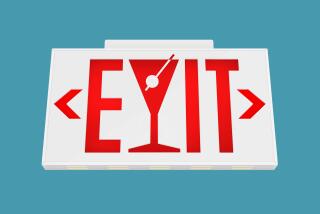Sometimes, survival’s cost is just too high
- Share via
Alcohol and cigarettes had been Joe’s closest companions on the battlefields and the home fronts of his life. Now his throat had finally succumbed to the assaults of his high-risk habits -- and cancer. The surgery to remove the tumor had taken much of the lower half of his weather-beaten face and left him needing a tracheostomy and feeding tube.
As a medical student in the late ‘70s rotating through the surgical ward of the veterans’ hospital in D.C., I diligently wrote the daily orders dictated by the senior resident on each patient’s chart. As Joe continued to recover from his cancer surgery, his orders over time reflected a greater degree of freedom on all counts except one.
With his throat and upper esophagus removed, he would remain NPO (nihil per orem or nil per os, or “nothing by mouth”) for the rest of his life.
As soon as he was allowed out of bed, Joe prowled the halls, a spectacle on his nightly voyages to the hospital’s smoking area where, despite our scolding, he would light another cigarette and bring it with a flourish up to the opening of his “trach” to inhale. The tobacco didn’t soothe his craving for liquids, though, and his irascibility led more than one nurse on his ward to fantasize about providing him with IV Scotch in exchange for a peaceful work shift.
Joe understood that the surgery had probably saved his life. Giving up oral food and water seemed like a small price to pay for the chance to live into his 60s and 70s. To us. But to him? Was a life without a soothing drink of alcohol, or even water, a life worth living?
Joe’s answer to that question came sooner than we expected. Coming onto the ward for morning rounds, we found his body under a bathroom sink a few days before his expected discharge. During the night, Joe had removed the sink’s curved underpiping, positioned his mouth under the now open drain, and drank from the opening. The water, unable to drain into his stomach, had flooded his nose, mouth and, most critically, his tracheostomy, drowning his helpless lungs.
Devastated, I turned to my more experienced colleagues. Joe knew that trying to eat or drink would kill him. He had been recovering so well -- why hadn’t he complied with our orders? Why would he choose to drink even if it meant his death?
The postmortem answers from my younger peers provided little solace. Possibilities included depression, “combat fatigue” (now, post-traumatic stress disorder) and alcoholic encephalopathy -- brain changes from alcohol overuse that result in dementia.
In the end, it was the senior attending surgeon who wisely counseled us that Joe had not chosen death at all; he had in fact chosen life. His passions -- however unhealthful -- for smoking, eating and drinking were integral to that life. His actions were not those of a depressed man giving up in the face of health challenges, but of a man seeking to conquer these challenges to recapture what he had treasured.
Joe had not opted for suicide so much as a fight for personal freedom.
I don’t know if I would ever make the same decision as Joe. I’m grateful that I’ve been spared the severity of illness and loss faced by many of my patients, and I could not begin to presume how difficult their choices must be when facing terminal health challenges. I have sought to help my patients find the best information, resources and care to address their health needs in such critical cases.
And, sadly, I’ve had patients whose resistance to life-saving treatment stems from fear, exhaustion, depression and despair: when the patient with recurrent cancer opts against chemo- or radiation therapy; when the patient with AIDS stops taking his antivirals; when the patient with brittle diabetes avoids using her needed insulin.
Counseling, education, social support, psychiatric consultation and other interventions can help some patients regain the will to fight their illness or disease. But for others, like Joe, the answer to such recommendations is a positive “no.”
Because of Joe, I’ve learned that some patients will walk away from our recommendations, not because they wish to court or hasten their death, but because they are choosing to make a last stand on their own terms.
*
Dr. Linda Reid Chassiakos is director of the Klotz Student Health Center at Cal State Northridge and a clinical assistant professor of pediatrics at UCLA.
More to Read
Sign up for Essential California
The most important California stories and recommendations in your inbox every morning.
You may occasionally receive promotional content from the Los Angeles Times.













